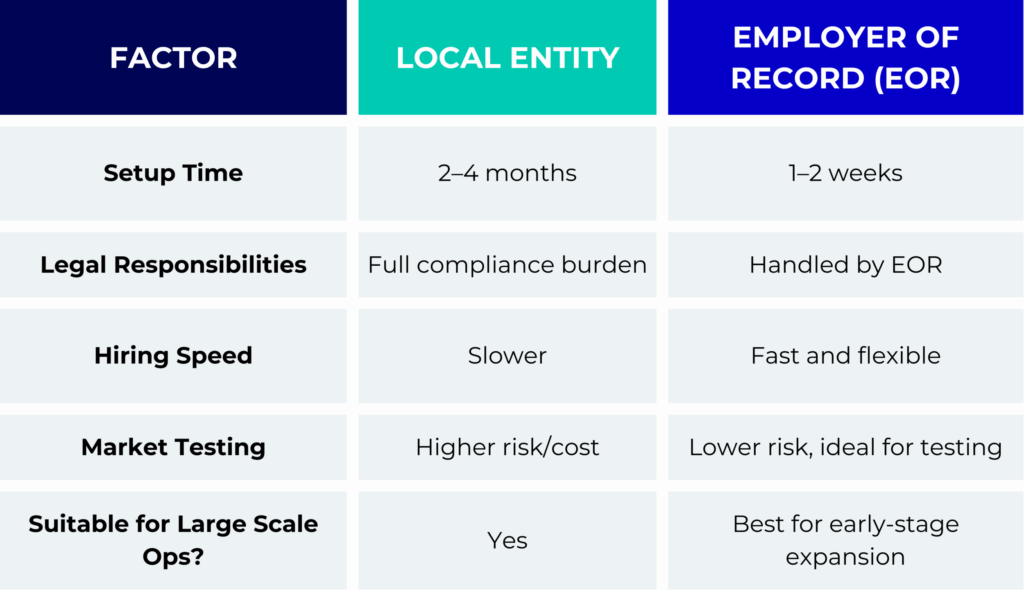14 August 2025
How to launch your business in Italy: research, hiring, and compliance tips
Italy is more than just a tourist hotspot—it’s Europe’s third-largest economy, with a strategic location, strong manufacturing base, and a growing digital economy. Whether you’re a startup testing a new market or a global brand planning a long-term expansion, knowing how to enter the Italian market effectively is key to long-term success.
But expanding into Italy comes with its own set of challenges: regional economic differences, a complex regulatory environment, and a distinctive business culture. This guide helps you plan your entry strategy—covering market research, employment considerations, cultural adaptation, and how Italian Employer of Record can help you scale without setting up a legal entity.
Understanding the Italian market landscape
Italy is a mature but evolving economy with unique opportunities across regions and sectors.
Market size, key industries, and regional opportunities
Italy has a population of over 59 million and is home to some of Europe’s leading industries, including:
- Automotive and manufacturing (e.g. Northern industrial hubs like Turin and Milan)
- Fashion and luxury goods (Milan)
- Agrifood and wine (Central and Southern regions)
- Tourism and hospitality (nationwide)
- Renewable energy, fintech, and tech startups (emerging sectors)
Regional economic dynamics matter: Northern Italy is industrialised and export-driven, while Southern Italy (the Mezzogiorno) offers growth potential but may present infrastructural and labour market challenges.
Trends and consumer behaviour insights
Italy’s digital adoption is increasing, especially in e-commerce, fintech, and remote services. However, consumer preferences still lean toward quality, design, and reputation over price. B2B relationships often rely on trust, long-term partnerships, and in-person meetings—especially in traditional sectors.
Conducting effective market research in Italy
Before investing, it’s vital to validate demand and understand local buyer behaviour.
Methods for researching Italian consumer and B2B markets
- Desk research: Use government reports (ISTAT), trade associations, and chambers of commerce.
- Surveys and focus groups: Ideal for consumer-facing products.
- Partnering with local consultants: To understand niche markets or cultural nuances.
- Trade fairs and industry events: These are valuable networking and research platforms.
Analysing competitors, demand, and pricing
Analyse local competitors’ positioning, pricing models, and distribution channels. In some sectors, strong local players dominate, requiring careful differentiation.
Validating product-market fit
Test interest through pilot launches, pop-up operations, or soft-entry methods like dropshipping or service trials. Alternatively, hire a small local team to test the market via an Employer of Record model.
Regulatory and operational considerations
Italy is part of the EU single market but has its own national and local regulations.
Licencing and sector-specific regulations
Some sectors—like finance, healthcare, or energy—require specific licences and registrations. Always check with local regulators or a legal advisor before launching operations.
Corporate tax environment and bureaucracy
- Corporate tax rate: Approximately 24% + regional taxes (IRAP).
- Bureaucracy: Expect slower administrative timelines than in other countries. Processes like business registration or VAT setup can take weeks.
Trade, import/export, and financial regulations
Italy follows EU trade rules, but certain customs or documentation requirements still apply—especially for products imported from outside the EU.
Data protection (GDPR) and compliance
As an EU country, Italy enforces GDPR. You’ll need clear data protection policies and processes, especially for customer data, hiring, and marketing activities.
Hiring and workforce strategy in Italy
Building the right team is essential for your Italian expansion, but hiring locally means understanding labour law, employee expectations, and recruitment norms.
Talent availability and skills landscape
Italy offers a strong talent pool in engineering, fashion, marketing, and tech—particularly in cities like Milan, Rome, and Bologna. However, certain regions may experience skill shortages or brain drain, pushing businesses to consider hybrid or remote models.
Local hiring laws and collective agreements
Italy has strict labour laws and sector-specific collective bargaining agreements (CCNLs) that dictate wages, working hours, and benefits. Employers must offer:
- Written contracts (in Italian)
- Social security registration (INPS, INAIL)
- Paid holidays, sick leave, and notice periods
How to legally hire without a local entity
Hiring directly as a foreign company is only possible if you establish a legal entity—which can be time-consuming and costly. An easier, compliant alternative is to work with an Employer of Record (EOR).
Pros and cons: Local entity vs. EOR


Adapting to Italian business culture
Understanding local norms can make or break your entry strategy.
Key values and communication styles
- Formality matters—use titles and last names in initial meetings.
- Expect longer lead times and detailed discussions before closing deals.
- Punctuality is appreciated, though flexibility may be needed.
Importance of personal relationships
Face-to-face interactions are essential. Trust-building and informal networking (e.g. over coffee or lunch) play a big role in decision-making.
Regional variations in work culture
Northern regions often align more closely with Central European norms (efficiency, structure), while the South may have more informal communication styles and longer decision cycles.
Tips for building partnerships and trust
- Learn some basic Italian—it’s a sign of respect.
- Be patient and open to negotiations.
- Avoid hard selling—emphasise value and partnership instead.
How an Employer of Record (EOR) supports market entry in Italy
What an EOR is and how it works
An Employer of Record in Italy is a third-party organisation that legally employs your team on your behalf. You retain day-to-day control, while the EOR handles compliance, payroll, contracts, and social security.
Hiring employees quickly without setting up an entity
With an EOR, you can:
- Onboard local employees within weeks
- Offer compliant employment contracts aligned with Italian labour law
- Avoid the cost and delays of registering a subsidiary
Ensuring compliance with Italian labour law, tax, and social security
The EOR ensures full registration with:
- INPS (pensions and benefits)
- INAIL (accident insurance)
- Agenzia delle Entrate (tax authority)
They also manage payslips, taxes, and annual filings.
EOR as a flexible option to test the market
Many businesses use an EOR to:
- Launch pilot teams (sales, support, or operations)
- Hire remote or hybrid workers legally
- Validate long-term potential before committing to local incorporation
Case example: Expanding a SaaS company via EOR
A US-based SaaS company wanted to test the Italian market by hiring a local sales rep. Instead of setting up a branch, they used an EOR to:
Ready to enter the Italian market? Start smart with the right support
Italy is a rewarding but complex market. From regional dynamics to employment laws and cultural expectations, success requires a well-planned strategy.
Whether you’re hiring local staff, testing demand, or preparing for long-term growth, working with Italian Employer of Record gives you speed, flexibility, and peace of mind.
Contact us today to explore how our EOR solutions can help you hire employees in Italy without an entity and build a compliant, low-risk entry into the Italian market.
